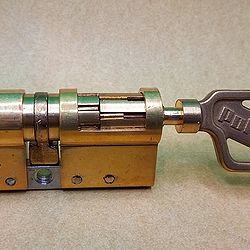Push Key: Difference between revisions
From Lockwiki
Jump to navigationJump to search
JasonAller (talk | contribs) (Created page with '=Push Key= A '''Push Key''' is one which sets the tumblers by longitudinal motion without rotation. Examples may have a biting across their leading edge which comes in contact wi…') |
m (→Push Key: links in captions) |
||
| (3 intermediate revisions by 2 users not shown) | |||
| Line 1: | Line 1: | ||
=Push Key= | = Push Key = | ||
A ''' | |||
[[Image:Pollux_7_cutaway_02-Qikom.jpg|thumb|250px|right| [[Pollux 7]]]] | |||
[[Image:Pollux_7_cutaway_05-Qikom.jpg|thumb|250px|right| [[Pollux 7]], correct key inserted and rotated]] | |||
A '''push key''' (or '''pump key''') is one which positions the components by longitudinal motion without rotation. Examples may have a bitting across their leading edge which comes in contact with components as the key is inserted and reaches the proper depth when the shoulder of the key reaches its stop. The most popular lock design that uses push keys are [[tubular]] [[pin-tumbler]]s. | |||
== See also == | |||
* [[Tubular]] | |||
* [[Keys]] | |||
* [[Lock]] | |||
[[Category:Keys]][[Category:Axial locks]] | |||
{{Stub}} | |||
Latest revision as of 00:11, 12 January 2023
Push Key

Pollux 7, correct key inserted and rotated
A push key (or pump key) is one which positions the components by longitudinal motion without rotation. Examples may have a bitting across their leading edge which comes in contact with components as the key is inserted and reaches the proper depth when the shoulder of the key reaches its stop. The most popular lock design that uses push keys are tubular pin-tumblers.
See also
| This article is a stub. You can help Lockwiki by expanding it. |

